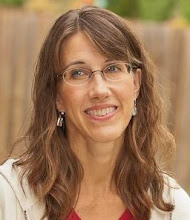
I just finished Gilead, by Marilynne Robinson, and it blew me away. One of the best books I have read in years. I can't wait to get my own copy and re-read it with a pencil in hand.
This book touched me in a similar way as Thornton Wilder's play, Our Town. It's all about the beauty and the gift of life, especially as it is appreciated by one dead (in Our Town) or nearing death. In Gilead, the narrator has a serious heart condition. He's in his 70's, but has a 7-year-old son to whom he is writing the narrative, knowing that his son will barely remember him. The narrator is a preacher, the son of a preacher who was a son of a preacher. He recounts family history as well as his own story of loss, loneliness and unimaginable happiness late in life; woven throughout is the story of another preacher father--the best friend of the narrator--and a wayward son--the namesake of the narrator--whose return home unearths old tensions for the narrator as he struggles to make his peace with the young man and the shadows of his own father, grandfather and brother.
The writing is absolutely beautiful, and the theology woven throughout is profound. I loved the many beautiful images of baptism and Eucharist, especially. Here are a few quotes that touch on many of the main themes of this remarkable novel:
If we can be divinely fed with a morsel and divinely blessed with a touch, then the terrible pleasure we find in a particular face can certainly instruct us in the nature of the very grandest love. (p. 204)
Wherever you turn your eyes the world can shine like transfiguration. You don't have to bring a thing to it except a little willingness to see. Only, who could have the courage to see it? (p. 245)
There are two occasions when the sacred beauty of Creation becomes dazzlingly apparent, and they occur together. One is when we feel our mortal insuficiency to the world, and the other is when we feel the world's mortal insufficiency to us. (p. 245)
Theologians talk about a prevenient grace that precedes grace itself and allows us to accept it. I think there must also be a prevenient courage that allows us to be brave--that is, to acknowledge that there is more beauty than our eyes can can bear, that precious things have been put into our hands and to do nothing to honor them is to do great harm. And therefore, this courage allows us, as the old men said, to make ourselves useful. It allows us to be generous, which is another way of saying exactly the same thing. (p. 246)

6 comments:
I have been wanting to pick this one up. Now I have even more reason ...
Thanks!
thanks for sharing that, Hen...I will go pick it up.
I was going to review this book this week, but you beat me to it. Wonderful book and great review.
Hi...I found you through Semicolon. Great review! You have made me want to read it! Thanks. :)
This is one of my favorite books of all time, and my top read last year. Her writing is so wonderful.
I appreciate your thoughts on this one. I've heard so much, but I wasn't sure that it was my thing. I will probably try to read it this year.
Post a Comment